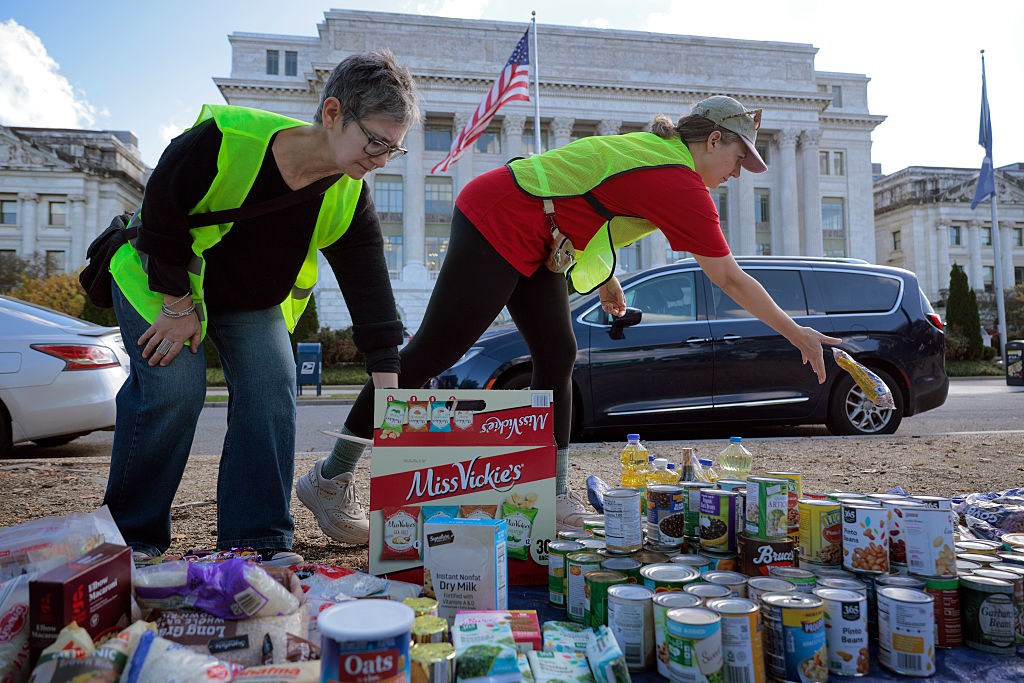The Supreme Court has allowed President Donald Trump to withhold about $4 billion in funding for food aid for 42 million low-income Americans this month, as the effects of the longest government shutdown in history continue to ripple across the country.
[time-brightcove not-tgx=”true”]
The court’s ruling, known as an administrative stay, came after the Trump Administration appealed a federal judge’s order to fully fund the program by Friday.
The administration had previously agreed to a judge’s order to partially fund the Supplemental Nutrition Assistance Program, known as SNAP or food stamps, by about $5 billion from a contingency fund, but it has objected to paying another $4 billion to fully fund the program.
Justice Ketanji Brown Jackson’s order gives a lower court additional time to consider the administration’s request to only issue partial funding.
The ruling will keep millions of Americans who are reliant on food aid on a knife’s edge. The benefits lapsed at the beginning of this month for the first time in the program’s 60-year history, leaving many recipients reliant on food banks.
Most SNAP beneficiaries are low-income families, seniors, and people with disabilities. They now face an anxious wait as the legal wrangling over the program continues in the coming weeks.
Longest shutdown in history
The SNAP program has become a political bargaining chip in the ongoing government shutdown, which has dragged on as Republicans refuse to extend Affordable Care Act subsidies for low- and middle-income Americans, which are set to expire at the end of the year.
The administration had initially planned to suspend SNAP payments altogether in November, citing a lack of funds due to the government shutdown.
But U.S. District Judge John McConnell in Providence, Rhode Island, ordered the administration on Oct. 31 to partially fund the program using emergency funds from the U.S. Department of Agriculture (USDA).
That began a lengthy legal back-and-forth with the administration, which led to the payments being partially funded.
Read more: We Love to Overplay Our Hands’: Democrats Debate Potential End to Shutdown in Light of Election Wins
On Thursday, in a separate ruling, Judge McConnell accused the Trump Administration of withholding SNAP payments for “political reasons” and ordered the USDA to give recipients 100% of their benefits.
“The evidence shows that people will go hungry, food pantries will be overburdened, and needless suffering will occur,” McConnell said during a virtual court hearing.
The Department of Justice challenged McConnell’s ruling, telling the Supreme Court that it would “sow further shutdown chaos” by prompting “a run on the bank by way of judicial fiat.”
But a gap between the Friday deadline in McConnell’s earlier ruling and the Supreme Court’s stay led some states to issue full SNAP payments.
Hours before the Supreme Court’s order, the USDA released a memo to states saying it was working to comply with the order. That led to New York, New Jersey and Massachusetts directing state agencies issuing SNAP benefits in full for November.
In a response to the Supreme Court’s decision, U.S. Attorney General Pam Bondi called McConnell’s ruling “judicial activism at its worst.”
“A single district court in Rhode Island should not be able to seize center stage in the shutdown, seek to upend political negotiations that could produce swift political solutions for SNAP and other programs, and dictate its own preferences for how scarce federal funds should be spent,” she wrote on X.

